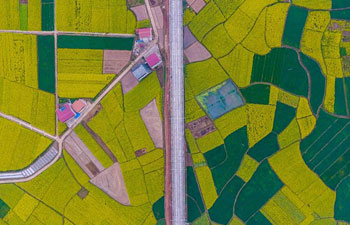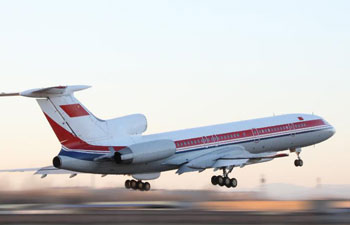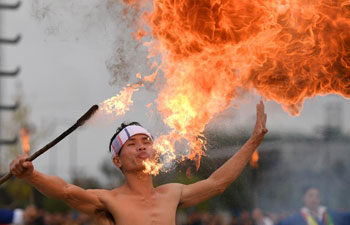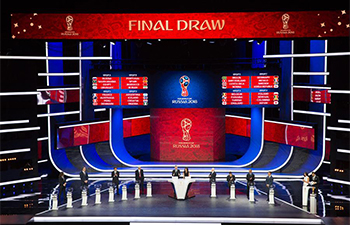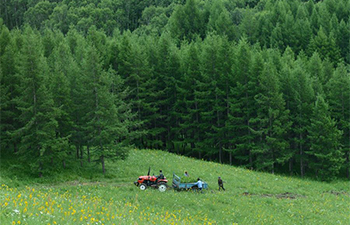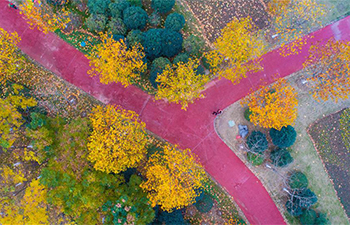
Qatari Emir Sheikh Tamim bin Hamad al Thani (Front) attends the 38th Gulf Cooperation Council (GCC) Summit in Kuwait City, Kuwait, on Dec. 5, 2017. The 38th Gulf Cooperation Council (GCC) Summit ended in Kuwait on Tuesday, stressing its commitment to unity and keenness to attain further coordination and integration across all sectors. (Xinhua/Muhammed Ayaan)
KUWAIT CITY, Dec. 5 (Xinhua) -- The 38th Gulf Cooperation Council (GCC) Summit ended in Kuwait on Tuesday, stressing its commitment to unity and keenness to attain further coordination and integration across all sectors.
Announcing conclusion of the summit, the Kuwaiti Emir Sheikh Sabah Al-Ahmad Al-Jaber Al-Sabah said GCC leaders exchanged points of view regarding various challenges facing the region.
Participants of the summit succeeded once again in affirming the strength of "our Gulf entity and its ability to defy challenges," the emir said.
The six member nations' leaders were committed to the GCC's goals and were convinced that the bloc serves their peoples' hopes and aspirations, said the summit final communique.
They reiterated support of proposals, including late Saudi King Abdullah bin Abdulaziz Al-Saud's to transform the bloc from a council to a union, build a joint defence mechanism and for economic integration, the communique said.
Describing the Houthi group's recent killing of Yemen's former leader Ali Abdallah Saleh as a "tragic development," GCC leaders said they are following up on the matter with "anxiety."
They also condemned Iran's destabilizing activities and intervention in the internal affairs of neighboring nations, noting that Iran should cease its support of terrorist groups that have a destabilizing impact on the region, particularly the Gulf, the communique said.
The summit also condemned the deadly attack on a mosque in Egypt's Al-Arish in North Sinai on Nov. 24.
On Palestinian affairs, the communique reiterated support of Palestinian statehood with a capital of Jerusalem, according to the 1967 borders, the Arab Peace Initiative and international laws.
It also rejected Israeli practices that breach international rules and regulations and aim to alter the legal, diplomatic and political status of Jerusalem.
The GCC Supreme Council welcomed the generous initiative of the Kuwait to host an international donor conference in 2018 to support the stability and reconstruction of liberated areas in Iraq from the so-called Daesh (Islamic State).
It called for a positive international cooperation in this conference and to assert the importance of refugees' return to their homeland under the international organizations concerned in coordination with the Iraqi government.
On Syria, the Supreme Council affirmed its firm positions on the Syrian crisis and the Geneva resolution, and Security Council resolution 2254 which provides the establishment of a Transitional Authority for the administration of the country, the drafting of a new constitution for Syria and the preparation of elections for a new future for the Syrian people.
On Lebanon, the Supreme Council affirmed the GCC's positions on the importance of maintaining stability of Lebanon, reiterating its commitment to Lebanon's security, stability and territorial integrity and supporting its efforts in confronting the Daesh and other terrorist organizations.
The Supreme Council affirmed its rejection of the role of Iran and Hezbollah in destabilizing Lebanon, weakening its political and security institutions, breaking up national unity and fueling sectarian conflicts.
The Supreme Council reiterated its keenness on the security, stability and unity of the Libyan territories and supporting the efforts exerted to confront the Daesh and other terrorist organizations.
The council stressed its support for the role of the United Nations in reaching a political solution to the Libyan crisis, praising the efforts of Ghassan Salama, the UN Secretary General's envoy to achieve this goal.





